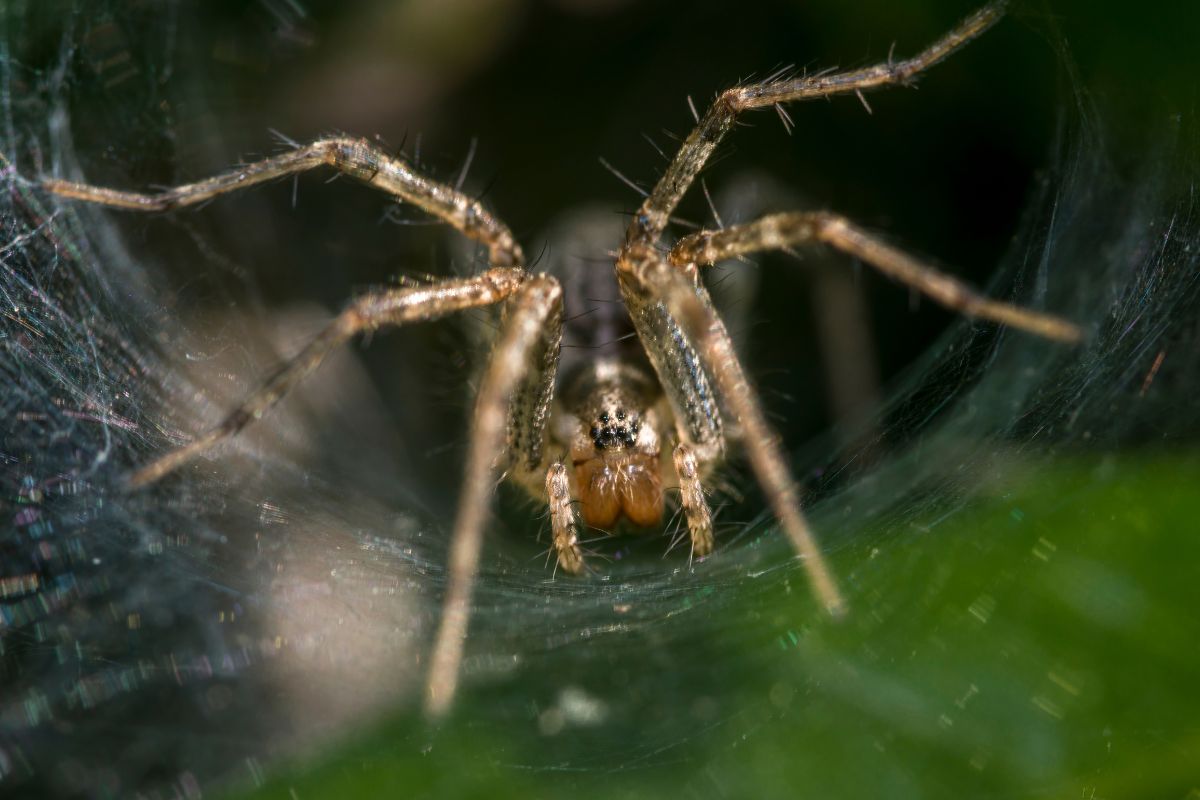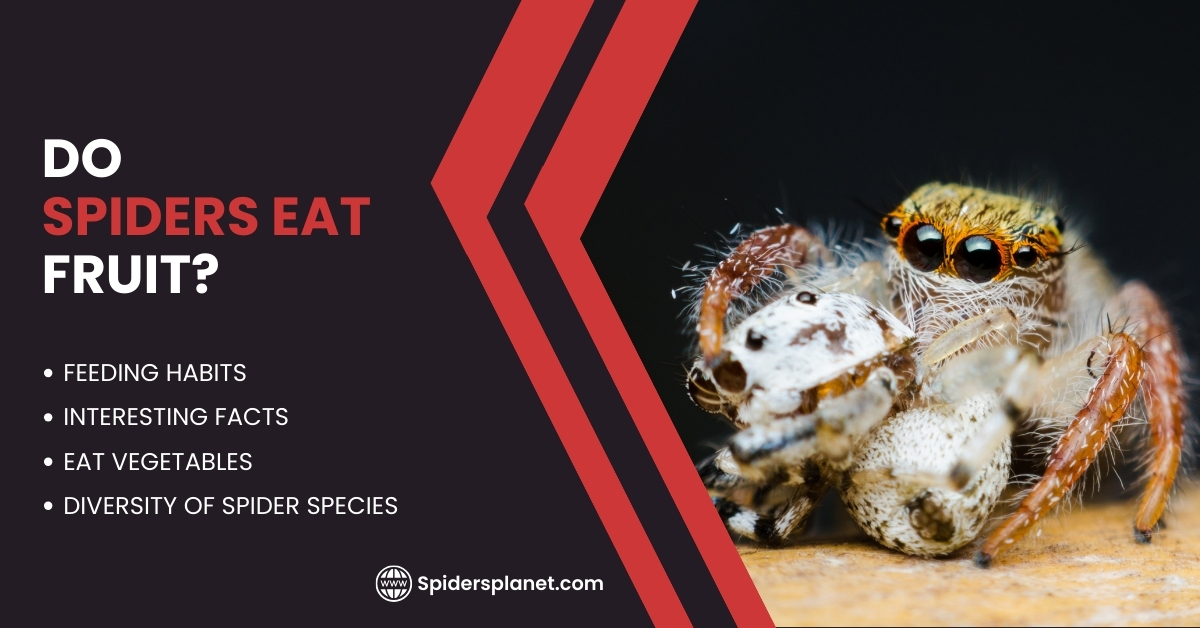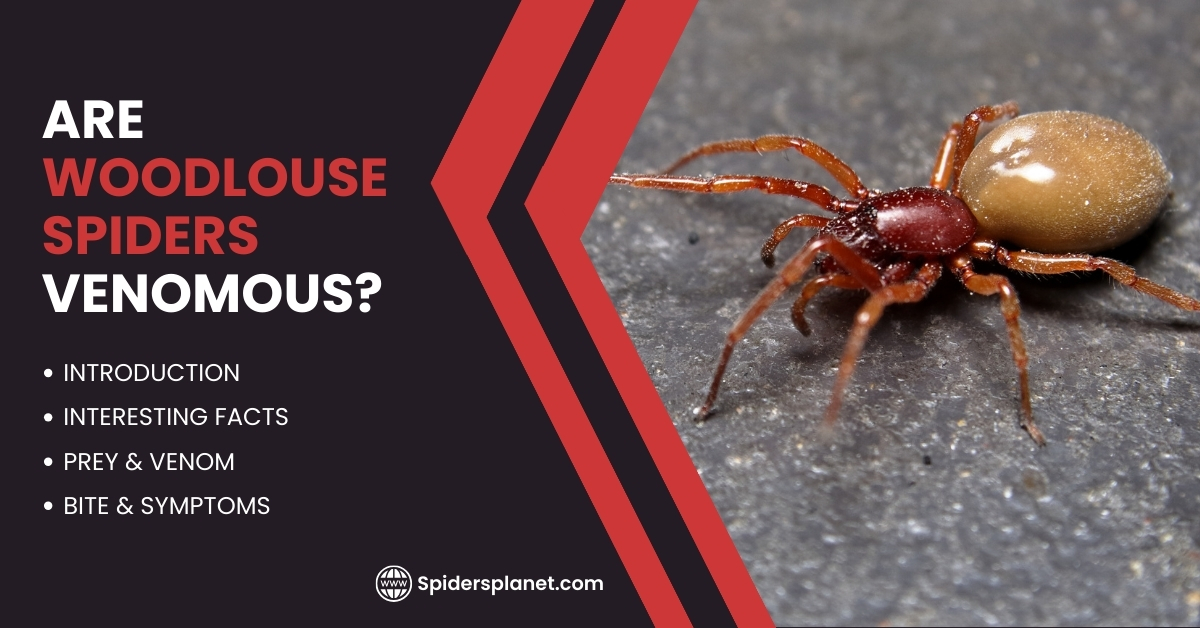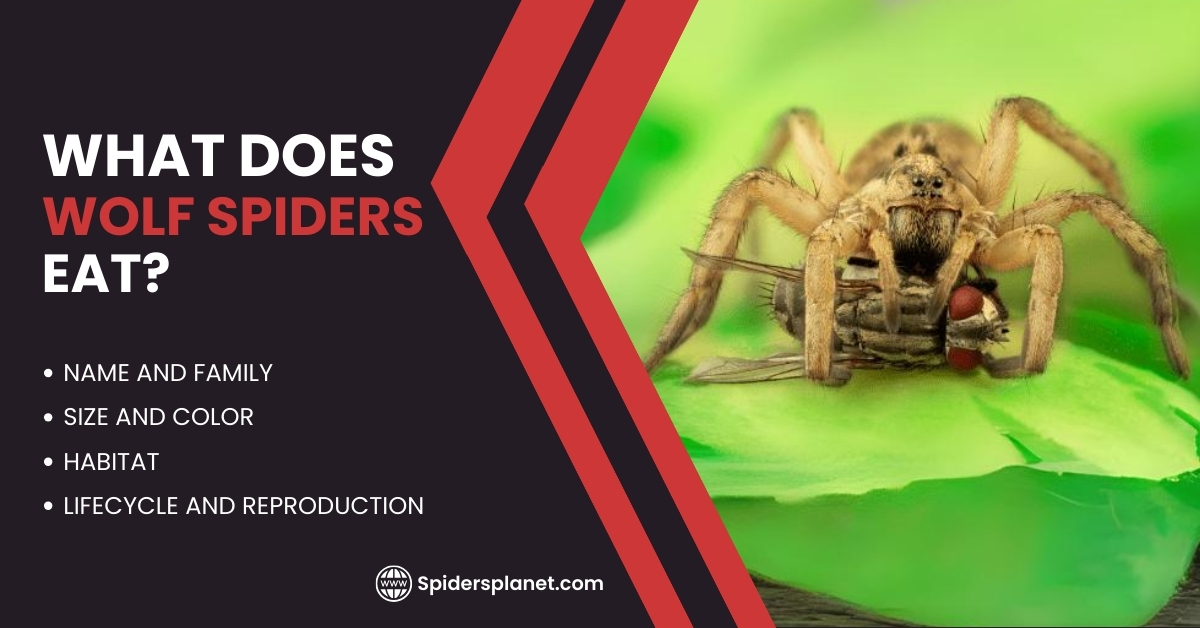On average, a spider will eat up to 3,000 insects per year. This may seem like a lot, but it’s actually not that much when you consider how many insects there are in the world.
Because wolf spiders are relatively large, their diet is usually very high in protein and fat. Which allows them to survive for weeks at a time without little to no food.
But, how long can a wolf spider live without food exactly? Well, this question is a bit tricky as it depends on the age, size, and sex of the wolf spider.
Typically, a full-grown adult wolf spider can go for one month without any food. However, at this point, the spider will be weak and will look very thin as it will be feeding off its own body reserves.
Wolf spiders, with their sharp eyesight and rapid movements, are masters of the hunt. But even the most skilled predator cannot always find its prey.
So, how long can these arachnids hold out before hunger pangs strike? Let’s delve into the fascinating world of wolf spiders and discover their surprising ability to go without food and water. Keep reading…!
An Overview of Spider’s Survival Without Food:
Spiders, eight-legged creatures we sometimes find a bit creepy, are known for being great hunters. But have you ever wondered how long they can go without eating? Well, it turns out, they can survive for quite a while!
Spiders are different from us because their body temperature depends on the environment, making their metabolism slower.
This means they need less energy and can make their meals last longer, kind of like a car engine idling instead of zooming down the road.
Even though spiders can go for weeks or even months without eating, it is not all easy for them.
During this time, they slow down a lot. They cease reproduction, experience limited growth, and prioritize survival over flourishing.
How long a spider can go without food depends on its species. Smaller spiders, like house spiders, might last 2-4 weeks, while bigger ones, like wolf spiders, can stretch it to 5-6 weeks.
The size matters because it affects how much energy they have stored.
Some spiders, called orb weavers, are really clever. They make intricate webs that work like traps, catching insects even when the spider is resting.
It is like setting up a buffet table and hoping someone walks by pretty smart!
Fasting is not the end of the world for spiders. They are tough creatures and can bounce back quickly once they get a meal.
Their metabolism speeds up, and they go back to spinning webs and catching flies.
Hence, when you come across a spider in the future, bear in mind that it is not simply a spooky creature.
It is a master of adaptation, a champion of resilience, and a survivor in a world where the next meal is never guaranteed.
Wolf Spider Diet and Feeding Frequency:
Wolf spiders, known for their sneaky hunting skills, are always on the prowl for a good meal.
Unlike spiders that build webs, these predators prefer stalking and chasing their food on the ground, turning dinnertime into an exciting event.
But what do these eight-legged hunters eat, and how often do they need to grab a bite?
Wolf Spiders are not Choosy When it comes to their Meals:
They mostly enjoy:
- Insects: Grasshoppers, flies, crickets, beetles, and other tasty creepy-crawlies are at the top of their menu. These spiders can manage prey that is significantly bigger than their own size.
- Other invertebrates: Worms, millipedes, and even small spiders might also become part of the wolf spider’s dinner.
Depending on the species and where they live, some wolf spiders might even catch frogs, lizards, or small snakes. Quite the adventurous eaters!
How often does a Wolf Spider Eat?
It depends on a few things:
- Size: Bigger spiders need more food, so they hunt more often. A huge wolf spider might eat every day, while a little jumping wolf spider can go a few days between meals.
- Prey Availability: If there are lots of insects around, these spiders can chow down frequently. When food is scarce, they adjust by slowing down their eating pace.
- Temperature: Wolf spiders, like many cold-blooded creatures, are more active and hungry in warmer weather. In colder times, they become slower and can go without food for weeks.
Wolf Spider’s Hunting Strategies:
These spider hunters have a bunch of tricks to catch their next meal:
Many wolf spiders patiently wait in leaves or under rocks, surprising prey that comes too close.
Some species actively chase down their food, showing off their speed and agility.
While not big on webs, some wolf spiders might spin simple ones near their homes to catch insects.
Feeding to Wolf Spiderlings:
If you have a pregnant female wolf spider that gives birth to a group of spiderlings, or baby spiders, she’ll take care of their food needs during the initial days of their lives.
Unlike many spiders, the wolf spider carries her newly hatched offspring on her back. During this period, the baby spiders typically sustain themselves by consuming the remnants of the egg sacs that once held them.
Once the nurturing phase concludes, the mother wolf spider goes about her own business, and you become responsible for supplying food for the baby spiders.
To prevent them from consuming each other, it’s essential to keep them apart during this phase. Offer small prey, such as fruit flies, to the baby spiders until they reach maturity.
Unlike adult spiders, they don’t require frequent meals and can be fed once every five days.
How Long Can Wolf a Spider Live Without Food?
In terms of general survivability without food, under optimal conditions studies suggest that wolf spiders can survive up to 54 days without food.
Average estimates show that typically, a wolf spider is expected to last 1-2 weeks without food under normal circumstances. For smaller meals or missed opportunities, wolf spiders can likely withstand several days without adverse effects.
Factors Affecting Wolf Spider’s Ability to Live Without Food:
The duration a wolf spider can endure without food is dependent upon several factors:
Species Variation: The specific type of wolf spider plays a pivotal role due to differences in metabolic rates and energy requirements. Generally, larger species exhibit greater resilience compared to their smaller counterparts.
Size and Age Impact: Older and larger wolf spiders are capable of having more substantial energy reserves, affording them a prolonged survival period compared to their younger, smaller counterparts.
Temperature Influence: Lower temperatures act to decelerate a spider’s metabolism, allowing for energy conservation and an extension of the fasting duration.
Humidity’s Role: Higher humidity proves advantageous as it aids in moisture retention, helping spiders conserve water and endure extended periods without food.
It is crucial to note that spiders require water even during fasting periods, emphasizing the significance of access to moisture for their prolonged survival.
How Long Can Baby Wolf Spider Live Without Food?
While adult wolf spiders are generally quite resilient when it comes to going without food, young baby wolf spiders are much more vulnerable and will struggle with this.
In general, most baby wolf spiders will only be able to survive for a week without eating any food. This is because hatchlings need a lot of protein and nutrients that they typically get for their prey in order to grow and develop properly!
If baby wolf spiders don’t eat enough food they will become malnourished, which can have a significant impact on their health.
What Happens To A Wolf Spider When It’s Starving?
When a spider goes without food for too long, it can have a huge impact on its health, and the mighty wolf spider is no exception.
Although wolf spiders can last longer than your average house spider, they can still experience negative effects when starving.
Some of the most common symptoms that a wolf spider experiences when starving includes:
- Weight loss: Since they are unable to find any food, wolf spiders will begin to lose weight and body mass over time. This is because they continue to use stored fat to create energy even when they are not eating.
- Reduced Mobility: As their energy levels decrease and their muscles begin to weaken, the wolf spider will become less mobile and struggle to hunt for prey.
- Change In Behavior: As the wolf spider becomes hungrier and weaker, its behavior will change. For example, the Wolf spider will be more notable during the day which is not normal for these spiders and some may even become more aggressive.
- Loss Of Coordination Or Balance: Wolf spiders may also experience problems with their coordination and balance, especially when they are walking, which can make it difficult for them to capture prey and defend themselves.
- Decline in Strength and Activity: Although a spider may endure weeks without food, its vitality and activity levels may diminish over time, affecting its hunting prowess and ability to evade predators.
- Reproductive and Molting Impact: Pregnant or molting spiders demand more energy, reducing their ability to survive without food compared to non-reproductive individuals.
- Environmental Stressors: Stressful environments can expedite the depletion of a spider’s energy reserves, thereby curtailing its fasting resilience.
Related Article:

Do Wolf Spiders Often Go Without Eating?
While there may be some wolf spiders that go without eating for a few weeks or months, most will do their best to find food as quickly as possible in order to survive.
In general, wolf spiders are very good hunters and tend to have high rates of success when it comes to capturing prey. As such, they rarely experience long periods of time without food.
However, there are some situations where a wolf spider may struggle to find food.
For example, if their normal hunting grounds have been disturbed due to natural disasters or human activities, they may be forced to go for longer periods of time without eating.
Additionally, if the prey in their environment becomes scarce, it may be difficult for them to find food on a regular basis.
The Impact of Seasonal Changes on wolf Spiders Eating Patterns:
Just like us humans, wolf spiders always deal with being hungry or full. But unlike us, their need for food is connected to the changing seasons, influencing when and how they eat in interesting ways.
In summer, when the days are long and insects fill the air, wolf spiders have a feast. The warm weather brings out lots of bugs like grasshoppers, beetles, and flies, giving the hungry spiders plenty to choose from.
The heat boosts their energy, making them like speedy, eight-legged engines. Wolf spiders take full advantage of the abundance, hunting often and enjoying multiple meals a day.
It’s a time of growth, making babies, and having lots of energy, all thanks to the summer’s plentiful food.
As the days shorten and leaves change in autumn, insects become scarce, prompting these wolf spiders to adapt their hunting methods and diversify their meals with smaller prey, worms, and even other spiders.
As temperatures fall, the wolf spider’s metabolism decelerates, conserving energy and lessening the necessity for regular meals.
In preparation for winter, certain wolf spider species, like the Pardosa militanea, engage in “fat-loading,” storing extra calories as fat reserves to endure the lean months ahead.
It is a seasonal shift, guiding the spider from an active, high energy mode to a more reserved state in anticipation of colder times.
As winter arrives, the insect sounds fade away, leaving the wolf spider in a quiet place. This is a time for survival, not feasting.
During this time, wolf spiders show a clever way of dealing with scarce food. They go into a special state where they use their stored energy, slowing down their bodies a lot.
It is like how bears hibernate, but these spiders, with their eight legs and sharp eyes, do it too.
They move less and find cozy spots in burrows or under rocks, saving energy while they wait for spring.
The once-active hunters become very still. Even though winter is tough, wolf spiders are tough too. After months of having little to eat, they can bounce back quickly.
When spring comes and insects return, they are ready to hunt again, starting the cycle of having plenty of food and then not much all over again.
How Long Can Wolf Spiders Live Without Water?
Thriving in the wolf spider realm resembles a delicate balancing act, particularly concerning their water needs.
Unlike animals with built-in water tanks, these eight-legged hunters need to find water outside to stay hydrated.
So, how long can they go without a sip? depends on a few things.
Wolf spiders are pretty clever at holding onto moisture. Their hairy bodies work like little funnels, collecting dew and rainwater and directing it to their mouths.
It is like having a natural water harvesting system. Plus, they have a slow way of using energy, which means they lose water slowly. Eating juicy insects also helps keep them hydrated.
But even with these tricks, how long a wolf spider can last without water depends on different things:
- Some kinds of wolf spiders, especially those living in deserts, are experts at saving water and can go for months without a drink.
- Smaller and younger spiders get dehydrated faster because they have less water inside them.
- Hot and dry places make them lose water faster, while humid areas help them keep moisture. Nights with cooler temperatures let them gather dew.
Dehydration can be a big problem for wolf spiders. It makes them slow and lazy, affecting how well they hunt and escape from danger. If it gets too bad, they could even die.
To avoid this, wolf spiders actively look for water. They might go to dewy spots, puddles, or the edges of ponds and streams.
Sometimes, when it is tough, they might even get moisture from plants to survive. So, in their world, finding enough water is a crucial part of staying alive.
Last Resort!
If the wolf spider’s prey starts to drop in numbers and is becoming harder to find then it may need to take drastic measures in order to survive. At this point, the wolf spider will be forced to turn to “cannibalism“, eating its own kind.
However, this is typically a last resort for wolf spiders, as it can be extremely dangerous and can lead to injury or even death.
Conclusion
So, how long can a wolf spider live without food? As before, the answer varies depending on the individual spider and its environment but, in general, wolf spiders are incredibly resilient creatures that can go for long periods of time without eating.
Related Articles:



